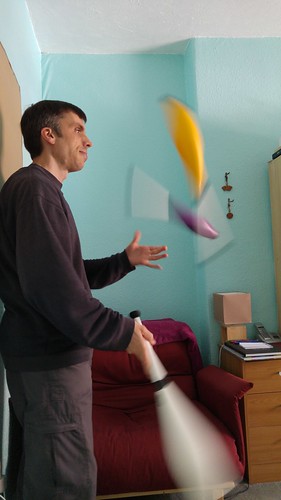In English you could say that you know a person, a place, a language or a fact. You could also talking about knowing about things, knowing of people, knowing how to do things, knowing hardship, knowing what’s what, knowing the ropes, and so on.
In Welsh to say you know a person or place you use adnabod or nabod. For exmple Dw i’n ei nabod nhw yn dda (I know them well), Wyt ti’n nabod Caerdydd? (Do you know Cardiff?).
When talking about knowing a fact you use gwybod. For example, Mae hi’n gwybod popeth (She knows everything), Dan ni’n gwybod tipyn bach am weu (We know a little about knitting).
In some cases you can use nabod and gwybod to show how well you know something. If you say Dw i’n nabod y gân ‘ma (I know this song), you mean that you are familiar with it, but can’t necessarily sing it. If you say Dw i’n gwybod y gân ‘ma it means you it well.
There are quite a few ways to say ‘I don’t know’ in Welsh: Dydw i ddim yn gwybod, Dw i ddim yn gwybod, Dwi’m gwybod, Sa i’n gwybod, Wn i ddim, ‘Dwn i ddim, and apparently in Bala they saw Wmbo.
To know how to do something is also medru, e.g. Mae o’n medru darllen (He can/knows how to read), and to not know how to do something is methu, e.g Dw i’n methu siarad Basceg eto (I can’t / don’t know how to speak Basque yet), at least in North Wales. In South Wales they say Mae e’n gallu darllen and Dw i ddim gallu siarad Basceg eto.
Irish equivalents of the above Welsh examples are:
– Tá aithne maith agam acu = I know them well
– An bhfuil tú eolach ar Chaerdydd? = Do you know Cardiff?
– Tá a fhios aici gach rud = She knows everything
– Tá beagán eolas againn faoi chniotáil = We know a little about knitting
– Tá a fhios agam an t-amhrán seo = I know (of) this song
– Tá an amhráin seo ar eolas agam = I know this song (well)
– Níl a fhios agam = I don’t know
– Is féidir leis léamh = He can read
– Níl Bascais agam go fóill / Níl mé abalta Bascais a labhairt go fóill / Ní féídir liom Bascais a labhairt go fóill = I don’t / can’t speak Basque yet
The other Celtic languages have various ways to express knowing, as do quite a few other languages, such as French, Spanish, German, etc.
Incidentally, when asked which languages you ‘know’? How do you answer? At what level would you say that you ‘know’ a language?
Sources: Geiriadur Yr Academi, WordReference.com, Reverso, fócloir.ie
Corrections are always welcome if I’ve made any mistakes.

